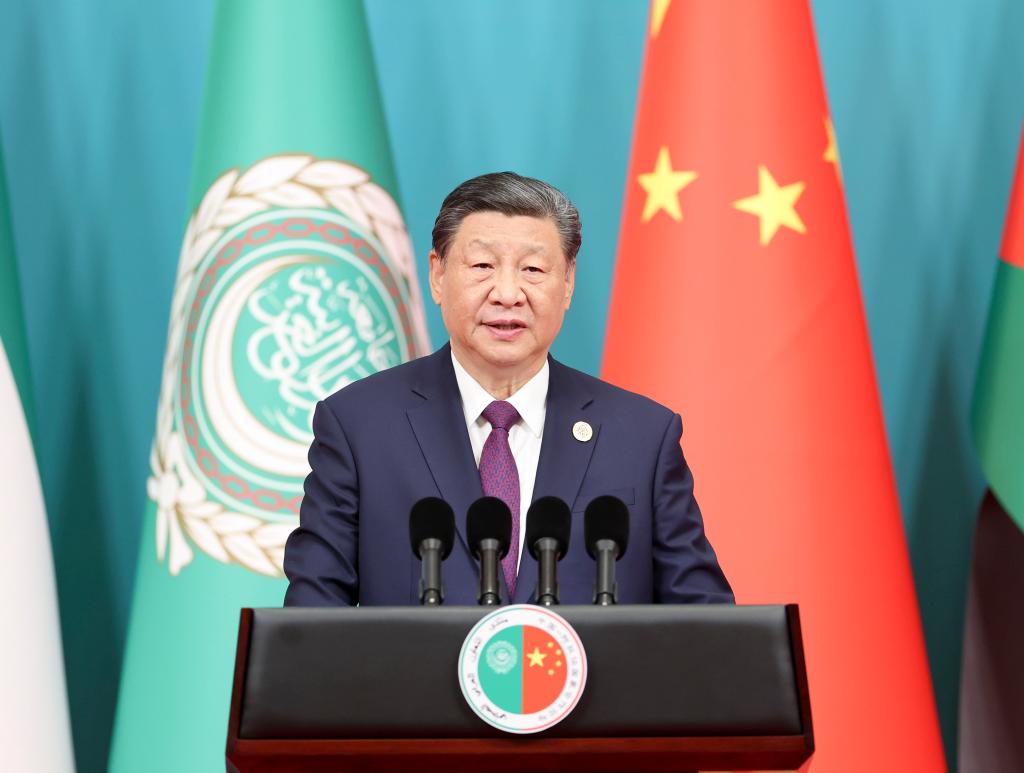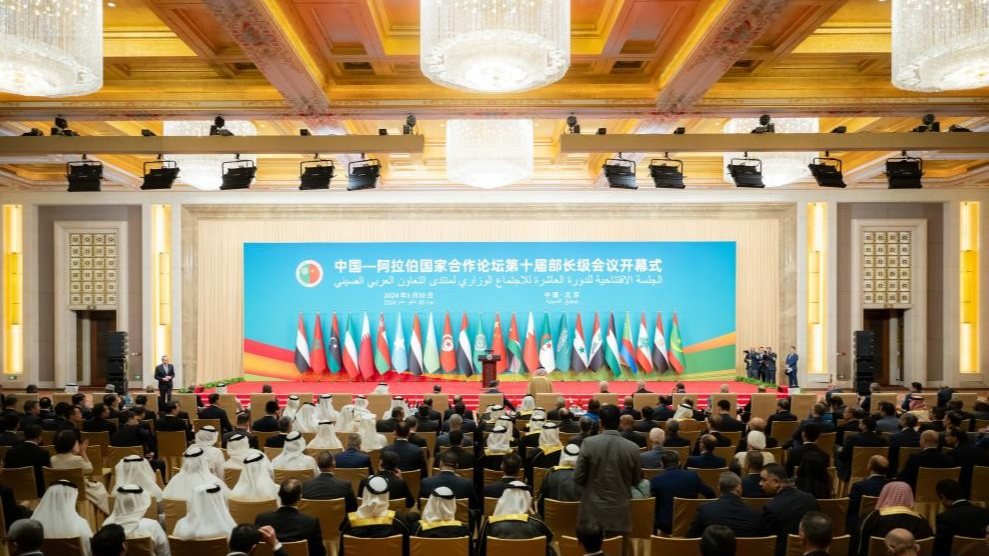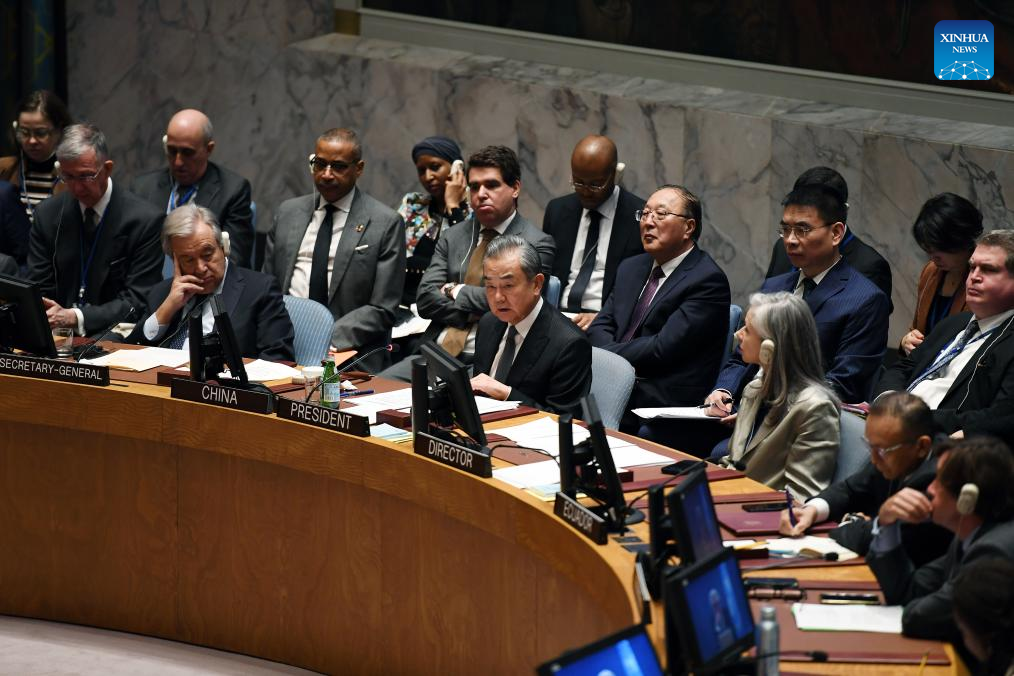The 10th Ministerial Conference of the China-Arab States Cooperation Forum was held on May 30 in Beijing.
The conference adopted the Beijing Declaration, the China-Arab States Cooperation Forum execution plan for 2024-2026 and a China-Arab states joint statement on the Palestinian issue on Thursday, presented as a significant stride towards building a China-Arab community with a shared future.
Chinese President Xi Jinping called on China and Arab states to deepen cooperation and step up the building of a China-Arab community with a shared future in a keynote speech at the opening ceremony of the meeting.

Chinese President Xi Jinping attends the opening ceremony of the 10th ministerial conference of the China-Arab States Cooperation Forum and delivers a keynote speech at the Diaoyutai State Guesthouse in Beijing, capital of China, May 30, 2024. (Photo: Xinhua)
China and Arab states are expanding high-quality cooperation, Chinese expert Liu Xinlu and Algerian expert Tayeb Toufik Dahar told the People's Daily. The consensus between China and Arab states on the Palestine-Israeli conflict can make tangible progress for promoting peace in the region, both experts agreed.
For Arab countries that expect to develop industries, China, a country with a complete industrial chain, is the best partner, said Liu Xinlu, dean of the School of Arabic Studies at Beijing Foreign Studies University.
China has advantages in production capacity, capital and labor, and the willingness to boost industrial capacity cooperation with Arab states, he said.
China's leading role in new energy vehicle development, the size of the automobile market in Arab countries and the Arab countries' need to reduce carbon emissions have led to China-Arab cooperation, Liu said.
Sovereign wealth funds from Arab countries have started to direct their investments towards China, said Tayeb Toufik Dahar, former deputy director of the Algerian Ministry of Interior. This not only reflects the stable and friendly cooperative relationship between Arab countries and China, but also can accelerate the financial development of both sides.
The joint construction of the Belt and Road by China and Arab states reflects a strategic shift towards diversity, innovation and sustainable development, strengthening bilateral relations and achieving mutual benefits, Toufik said.

The opening ceremony of the 10th ministerial conference of the China-Arab States Cooperation Forum is held in Beijing, capital of China, May 30, 2024. (Photo: Xinhua)
Both experts believe the consensus between China and Arab countries on the Palestinian-Israeli issue can achieve tangible progress for peace and stability in the region.
"China's proposal to Arab countries is to seek common ground and build a balanced, effective and sustainable security framework, thereby achieving universal security and common security," Liu said. China aims to build order and comprehensive reconciliation, which was undoubtedly distinct from the confrontational order constructed by Western countries, especially the United States, he said.
"That is the fundamental path to resolve the conflict," Liu said.
A China-Arab states joint statement on the Palestinian issue was adopted at the 10th ministerial conference of the China-Arab States Cooperation Forum on Thursday, emphasizing the firm stance and important consensus of the two sides in promoting a cease-fire in Gaza, ensuring humanitarian aid and supporting Palestine's full membership in the United Nations.
In an interview with Al Jazeera Media Network in April, Chinese Foreign Minister Wang Yi said that China firmly opposed the forced transfer of Palestinian civilians and collective punishment of people in Gaza since the beginning of the conflict.
The historical injustice to the Palestinian people must be redressed in a timely fashion, Wang said.
Toufik said that this strong Chinese stance, with China's diplomatic and economic weight in the world, would play a role in resolving the Palestinian-Israeli issue.

As the rotating president of the United Nations Security Council for November, China holds a Security Council high-level meeting on the Palestinian-Israeli issue here on Nov. 29, 2023. Chinese Foreign Minister Wang Yi, also a member of the Political Bureau of the Communist Party of China Central Committee, chairs the meeting. (File photo: Xinhua)
Arab countries have shown a growing enthusiasm for learning Chinese. This not only demonstrates the appeal of Chinese culture but also underscores the significance Arab countries attach to China, Liu said.
The establishment of the China-Gulf Cooperation Council bilingual library for people-to-people cultural exchanges and mutual learning in 2023, as a typical example, is poised to construct a broader platform facilitating enhanced exchanges between China and the Arab world, he said.
This is a positive trend that should be embraced, Liu said. More efforts should be made to enhance people-to-people exchanges and reach consensus, especially among young people, he said. (Interns Zhang Jingjie, Chen Yantong and Meng Jiahui contributed to this story.)


